Ares was the Ancient Greek god of war, bloodshed and violence. Son of Zeus and Hera, the King and Queen of the Gods, he was one of the twelve major Olympian Gods. However, unlike other deities in the Greek pantheon, Ares didn’t enjoy a place of prominence in ancient Greece due to his relation with the distasteful aspects of brutal warfare. Thus, compared to other gods, there are relatively fewer myths featuring Ares. Out of them, the most legendary myth involving him is his adulterous relationship with Aphrodite, the Olympian goddess of love, beauty, pleasure, passion and procreation. Other famous myths featuring Ares include his contest against Hercules; his love affair with Eos; his wrath on Cadmus; and his transformation into a wild boar to kill Adonis. Moreover, Ares also played a minor role in the Homeric epic The Iliad. Here are the 10 most famous myths featuring the ancient Greek god Ares.
#1 Birth of Ares
In Greek mythology, Ares is the eldest and the only son of Zeus, the King of the Gods; and his sister-wife Hera. He is usually considered to have been born naturally as a result of union between his father and mother. However, there is another myth according to which Hera had Ares without the help of Zeus by using a magical herb. When Zeus had a daughter without a mother, Hera was enraged and wanted to have a son without a father. Khloris, the goddess of flowers and a nymph, made Hera touch a magic flower. This magic flower made her pregnant and resulted in the birth of Ares. Ares is one of the 12 Olympian Gods who resided atop Mount Olympus. The Olympians managed to become the supreme deities after a 10 year long struggle known as Titanomachy. In this struggle, Zeus, the father of Ares, led his siblings to victory over the Titans who were the ruling deities at the time. Although there are a number of immortal residents at Mount Olympus, only 12 of them are considered the most important ones. These include the children of Titans Cronus and Rhea; namely Zeus, Hera, Poseidon, Demeter and Hestia; along with the main offspring of Zeus; namely Athena, Apollo, Artemis, Ares, Hephaestus, Hermes, Dionysus and Aphrodite.

#2 Ares And Aloadae
Aloadae is the collective name for two giants namely Otus and Ephialtes. They were the twin sons of Poseidon, the god of the sea; and a mortal named Iphidemia. Both of the brothers were aggressive hunters and grew enormously at a young age. According to a myth, Aloadae hatched a plan to storm Mt. Olympus, the home of the gods, by piling up three mountains namely Olympos, Ossa and Pelion, one on top of the other. Their main motive was to gain access to goddesses Artemis and Hera; Otus desired Artemis and Ephialtes desired Hera. Ares, the god of war, tried to stop them but Aloadae managed to defeat him. They subsequently imprisoned Ares inside a bronze urn in the island of Naxos for thirteen months, a lunar year. It would have been the end of Ares, if Eriboea, the stepmother of the giants, wouldn’t have informed Hermes, the herald of the gods. Ares was held screaming and howling in the urn until Hermes rescued him. The attempt of Aloadae to storm Mount Olympus was unsuccessful. Artemis, the goddess of hunt, transformed herself into a beautiful stag and raced between the two giants. Being hunters, they both cast their spears at the stag but missed their mark and instead struck each other dead.
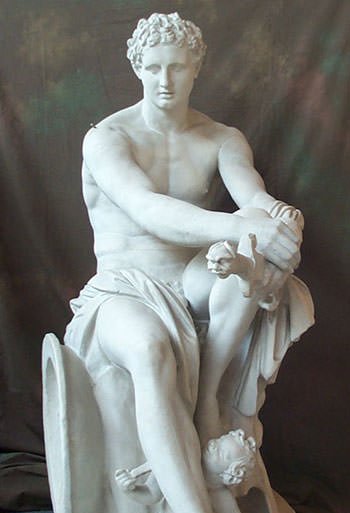
#3 Ares And Aphrodite
Aphrodite was the Olympian goddess of love, beauty, pleasure, passion and procreation. In Greek mythology, she was married to Hephaestus, the god of blacksmiths and metalworking. Despite this fact, Aphrodite was unfaithful to him and got involved in an affair with Ares. Hephaestus spent every night in his workshop. Aphrodite and Ares took advantage of this situation to make love, until dawn. Ares was always accompanied by a young man named Alectryon, whose duty was to let them know when Helios, the Sun, appeared on the horizon. However, one day, Alectryon, tired of such exhausting daily routine, lost track of time and failed to inform the couple. Thus Helios saw Ares and Aphrodite locked in a passionate embrace and he immediately informed Hephaestus. Hephaestus was extremely hurt and thought of revenge. Contriving to catch the illicit couple in the act, Hephaestus fashioned a finely-knit and nearly invisible net and left it on the bed. This net trapped the lovers locked in very private embrace. Hephaestus was present at the situation and summoned all the Olympian gods and goddesses to view the unfortunate pair. Although the goddesses displayed reluctance, the male gods went to witness the sight and passed lewd comments. After this incident, the lovers were released and each of them had to go their separate ways. Ares returned to his homeland, Thrace, while Aphrodite went to Paphos.

#4 Ares And Eos
Eos, the Greek goddess of the dawn, was the daughter of the Titans Hyperion and Theia. Eos fell in love with Ares, and like so many others, he could not resist the beauty of Eos. Dressed in long robes of saffron, and sitting upon her throne she glimmered and cast an irresistible look upon Ares. Thereafter, Eos and Ares had a very brief love affair. During the affair, Ares was cautious of Aphrodite, his most famous lover, of finding about them. Thus the two lovers would hide in the woods. Meanwhile, on Mount Olympus, Aphrodite wondered about the whereabouts of Ares. Perplexed and unsuccessful, she went to ask Athena if Ares was with her planning war strategies. Athena told her pet owl to locate Ares for her; and for Aphrodite to follow the owl. Thus Aphrodite found Ares and Eos on a cliff-side, holding hands. Out of vengeance, anger and bursting with jealousy, Aphrodite cast a curse upon Eos with an insatiable sexual desire and to be perpetually in love. This caused Eos to abduct a number of handsome young men, most notably Cephalus, Tithonus, Orion and Cleitus.
#5 Ares And Adonis
Adonis, in Greek mythology, was a youth of remarkable beauty and the son of Theias, King of Syria, and Myrrha. Due to his astonishing beauty, Aphrodite became charmed at this young man. Adonis was a master of the hunt. Being the favorite of Aphrodite, the goddess warned him not to stray too far into the forest during his hunting spree to avoid any possible mishap. However, the heart of young Adonis was audacious, and neglecting Aphrodite’s warning, he plunged deep into the forest. All of a sudden, came upon a wild boar and, no matter how much he tried, he could not scare it away. The boar attacked Adonis and with one massive heave of its head pierced the young man with its tusk. According to myth, the boar that killed Adonis was no ordinary beast but Ares, the lover of Aphrodite. Jealous of Aphrodite’s passion for Adonis, Ares disguised himself in the form of a boar and killed Adonis.
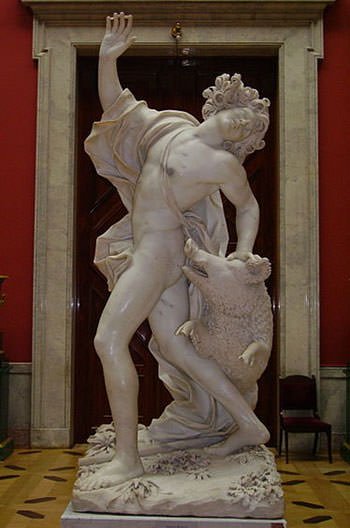
#6 Ares And Halirrhothius
Alcippe was the daughter of Ares and Aglaulus. Halirrhothius, the son of the Sea God Poseidon, raped Alcippe. Out of vengeance and immense anger, Ares killed Halirrhothius. For this murder, Poseidon summoned Ares to appear before the tribunal of the Olympic gods. The trial was held on a prominent rock outcropping located northwest of the Acropolis in Athens, Greece. Ares was acquitted by the court made up of his fellow gods. Although declared innocent, but to purify himself from the murder, Ares was convicted to work as a slave for a year. Due to this trial the hill became known as Areopagus. The name is the Late Latin composite form of the Greek name Areios Pagos, translated as “Hill of Ares”. In ancient Greece, Aeropagus functioned as the court for trying deliberate homicide, wounding and religious matters. Later, the Romans referred to the rocky hill as “Mars Hill” after Mars, the Roman equivalent of the Greek God.
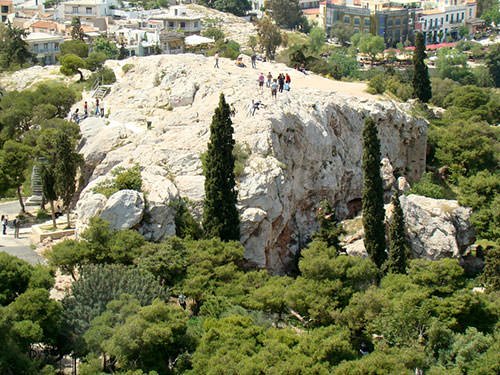
#7 Ares And Hercules
Hercules was a divine hero and a demigod in Greek mythology. He was the son of Zeus and Alcmene; and the foster son of Amphitryon. On his way to the Oracle of Delphi, Hercules came across Cycnus, a son of Ares and a blood-thirsty killer. Cycnus was infamous for killing pilgrims on their way and using their skulls to build a temple in honor of his father. Cycnus challenged Hercules to a wrestling duel. He hurled his spear at Hercules’ shield, but failed to penetrate it. Then Hercules drove his spear through Cycnus’ neck, killing him. When Ares found out about the death of his son, he was enraged and attacked Hercules with his spear. However, Athena, the protector goddess of Hercules, turned his spear away. Ares then drew his sword and moved to strike Hercules. However, the demigod found an opening and thrust his spear into the thigh of Ares. The injured Ares was taken to safety by his sons Phobos and Deimos.
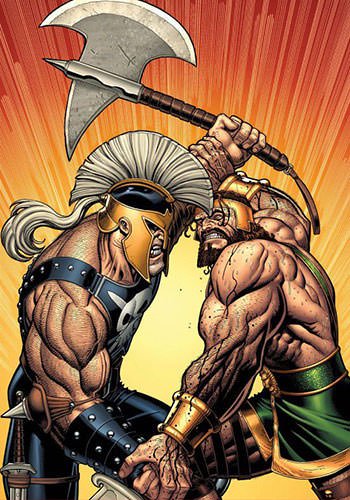
#8 Ares And Sisyphus
Once, Zeus took the form of an eagle and abducted a nymph named Aegina. He took her over to an island near Attica, which became known by her name. King Sisyphus of Corinth knew about this abduction. He revealed the whereabouts of Aegina to her father, the river god Asopus, in return for causing a spring to flow on the Corinthian acropolis. Infuriated, Zeus ordered Thanatos, the personification of death, to chain Sisyphus and throw him into Tartarus, a deep abyss where the wicked received divine punishment. However, Sisyphus tricked Thanatos to chain himself and held him captive. Due to this, no one died on Earth. This caused an uproar, especially for Ares as he was annoyed that no human or monster died in battles. Soon, Ares found out the problem; rescued Thanatos; and turned King Sisyphus over to him. As a punishment for his trickery and cheating death, Zeus sent Sisyphus to Tartarus, where he was made to roll a huge boulder up a steep hill for eternity.
#9 Ares And Cadmus
Cadmus was the founder and first king of Thebes, a powerful town in the ancient times, close to Athens. Europa, the sister of Cadmus, was abducted by Zeus. Devastated, Cadmus began searching for her everywhere. Unsuccessful, he consulted the oracle at Delphi. He was ordered to give up his quest and follow a special cow, with a half moon on her flank; and to build a town on the spot wherever he would see the cow kneel. Following the instruction, he founded the city of Thebes. Intending to sacrifice the cow to Athena, Cadmus sent some of his companions, to a nearby spring to bring water for the rites. However, the spring was guarded by a Dragon-Serpent, the offspring of Ares and Erinys of Tilphosa. When the men did not return, Cadmus went in search of them and found the dragon feeding on the flesh of his companions. Out of anger, Cadmus killed the dragon. When Ares found out that someone had killed his son, he became furious and made Cadmus do penance for eight years by serving him. At the expiration of this period, as a form of reconciliation, Ares gave Cadmus the hand of his daughter Harmonia, a product of Ares’s union with Aphrodite. In this way, Cadmus harmonized all strife and began a dynasty with Harmonia with a son, Polydorus; and four daughters, Agave, Autonoe, Ino and Semele.
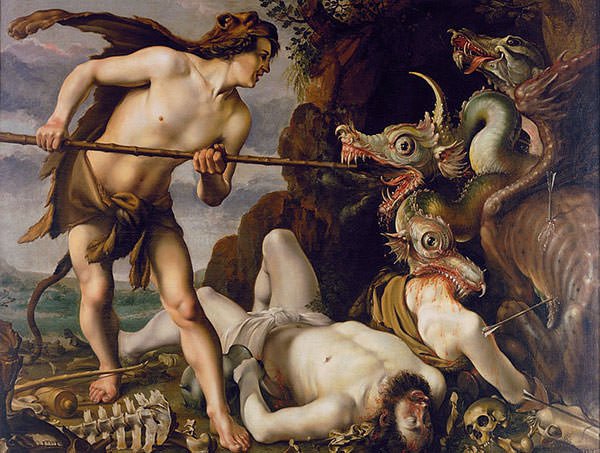
#10 Ares In The Iliad
In Homer’s epic The Iliad, Ares has little contribution in the Trojan War, in spite of being the God of War. At the outset of war, Ares promised his mother Hera and half-sister Athena that he would fight on the side of the Greeks. However, he was persuaded otherwise by his lover Aphrodite. Aphrodite sided with the Trojans, mostly because of Paris; who had given her the Golden Apple ahead of Hera and Athena. Ares thus broke his promise and took allegiance with the Trojans, taking the lead on the battlefield. He was accompanied by his frightening sons Phobos and Deimos and his sister Eris. During the war, Diomedes, the Greek hero saw Ares fighting on the Trojans’ side. Out of vexation, Diomedes took Athena’s help and injured Ares with his spear, causing him so much pain that he had to withdraw from battle. Thereafter, Ares fled to Mt. Olympus, forcing the fall back of the Trojans. Ares also lost a son in the war, called Ascalaphus. During that period, all the gods were ordered by Zeus to withdraw from battle. Despite the order from the King of the Gods, Ares, in his rage, wanted to avenge his son. However, he was restrained by Athena. Later, when Zeus allowed the gods to fight, Ares was the first to act; attacking Athena to avenge himself for his previous injury. However, Athena overpowered him by striking Ares with a boulder. In the end, it was the strategy and intelligence of Athena that won over the raw blood-thirst of Ares as the Greeks defeated the Trojans. The Iliad mostly shows Ares in a negative light.

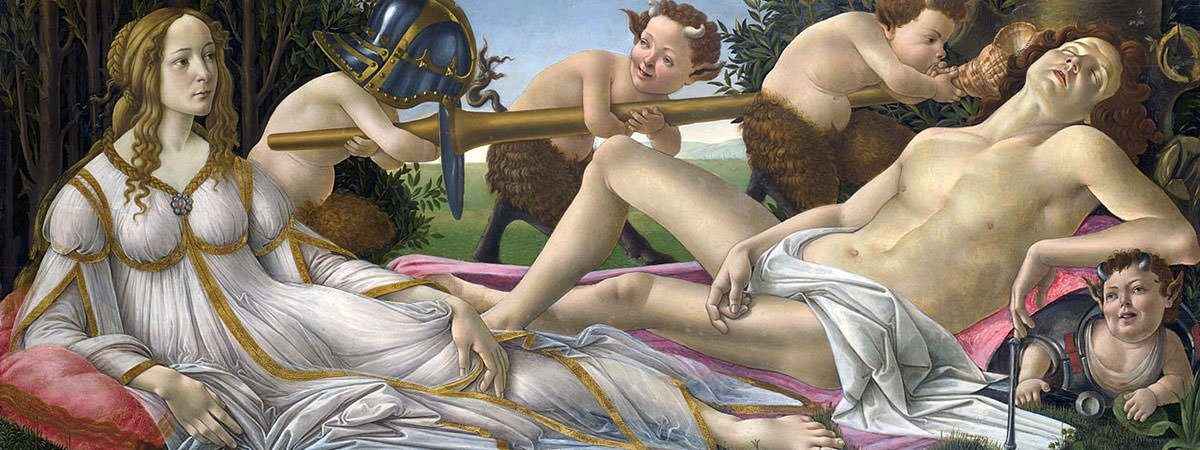
I have used this website quite a lot for my Classics Class, and usually it’s okay, but I wish there was more stories and more detail in the existing stories. Still, it’s very useful and very informative.
Thanks for your appreciation. We will keep your suggestion in mind.
Hello there! I’m a Hellenistic pagan, and Ares is my patron God! Thank you for your brief and understandable descriptions! I’ve read about a lot of these already, yet usually the text is very difficult to read due to the complexity. While it’s always good to read the original source, your telling of the story is much easier to read and is helpful to have as well. Thanks!
You’re welcome.
This was a big help for an assignment I had to do on Ares, and I wanted to say thanks to the person who wrote this.
You’re welcome and happy to help with your assignment.